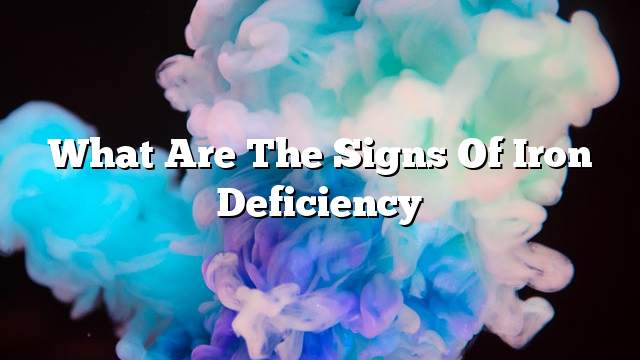Iron deficiency
Iron deficiency is the most common type of undernourishment in the world. It is more common in children and women, especially pregnant women. It causes developmental delays and behavioral disorders in children. In pregnant women, it increases the chances of premature birth and the birth of underweight babies.
Iron is found in all cells of the human body and has many vital functions. It acts as an oxygen carrier from the lungs to the body’s various tissues, in the form of hemoglobin, which accounts for 80% of the effective iron in the body. The form of myoglobin, in addition to its composition of an intracellular electron vector in the form of cytokrome, and also forms an essential part of the reactions of enzymes in different tissues of the body.
Iron deficiency patients have different stages; the simple form may not cause any physiological disorders. The effective iron ratio is normal, but the deficiency is in the iron stores. The most serious form of iron deficiency is the resulting anemia, leading to a decrease in production Iron-containing compounds such as hemoglobin, which result in small red blood cells and reduced dye, may affect the functions of many body organs.
Causes of iron deficiency
Iron deficiency is the most common cause of anemia and has several causes:
- There are many foods rich in iron, such as meat, eggs and some leafy vegetables. As iron is an essential element of the human body, especially in the form of growth and growth, children and pregnant women are advised to eat large quantities of these foods.
- Birth and hemorrhage in menstruation: Menstrual bleeding and bleeding at birth are the most common causes of iron deficiency in women.
- Suffering from internal hemorrhage: There are many pathological conditions that cause this: stomach ulcers, benign tumors in the colon and small intestine, colon cancer, and repeated use of painkillers such as aspirin.
- The inability of the body to absorb iron: The suffering of certain diseases and undergo surgery affect the ability of the intestines to absorb iron from food, and these diseases Celiac disease, an autoimmune disease, attack and destroy the antibodies of the immune system lining the small intestine, Iron-deficiency surgery is called gastric bypass.
- Infection with vascular dysfunction: blood vessels are dysfunctional, fragile and superficial, and are therefore very susceptible to bleeding.
- Suffering from chronic kidney disease, inflammatory bowel disease; as a bronze disease, esophagitis, intestinal infection with parasitic infection, exposure to large wound, as well as donation of large amounts of blood.
Signs and symptoms of iron deficiency
Iron deficiency in the human body may not cause anemia, and even if this is caused, the patient may not have any signs or symptoms. If the iron deficiency anemia is severe, the following signs and symptoms may accompany:
- Feeling tired and tired.
- Suffering from shortness of breath.
- Pulsation, a feeling of heartbeat, may also be affected by the patient heart rate and may have chest pains.
- Pale skin color, in addition to the sense of itching.
- Feeling pain in the head.
- Ear infection, which is hearing the patient from the sounds coming from inside the body.
- Taste disorder in the patient.
- Suffering from anorexia, especially in infants and children.
- Irritation and ulceration of the tongue, and the patient may have painful ulcers on the corners of the mouth.
- Suffering from hair loss.
- The nail breaks, and its shape may change into a spoon shape.
- Suffering difficulty swallowing, some patients may feel a strange desire to eat things that are not eaten, such as paper, snow, mud, called this mark Bika.
Treatment of iron deficiency
The treatment of iron deficiency anemia is followed by three methods: iron supplements, dieting, iron deficiency treatment, dietary supplements to compensate for iron deficiency, the so-called iron sulfate (iron sulphate) And is usually given in the form of pills taken twice a day, and may be accompanied by the feeling of side effects such as abdominal pain, diarrhea or constipation, and burning sensation, as well as turn the color of stool to black, if the patient suffered severely from these side effects, Iron iron contains iron, which may require longer time to treat iron deficiency. In some rare cases, chronic kidney disease may be given to iron in the form of injections.
If the diet contributes to iron deficiency, it is recommended to eat rich foods such as watercress such as watercress, legumes or iron-fortified bread, brown rice, It is also recommended to reduce the intake of foods and medicines that reduce the absorption of iron such as tea and coffee, dairy products for containing calcium, as well as anti-gastric drugs, and inhibitors Proton channels, which are used to treat ulcer and indigestion.
It is necessary to treat the underlying cause of iron deficiency anemia. For example, if the treatment of NSAIDs is the cause of bleeding, it should be discontinued. Some medications should also be taken; contraceptives for severe menstrual bleeding, Other medicines for the treatment of stomach ulcers, in addition to undergo surgery to eradicate benign or malignant tumors.
